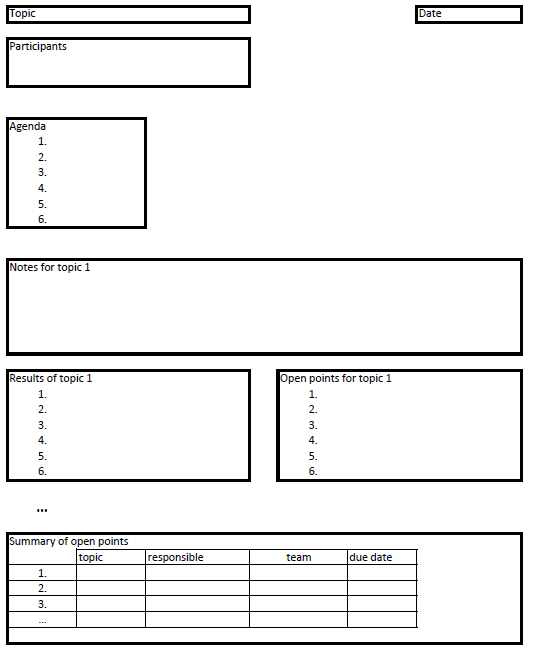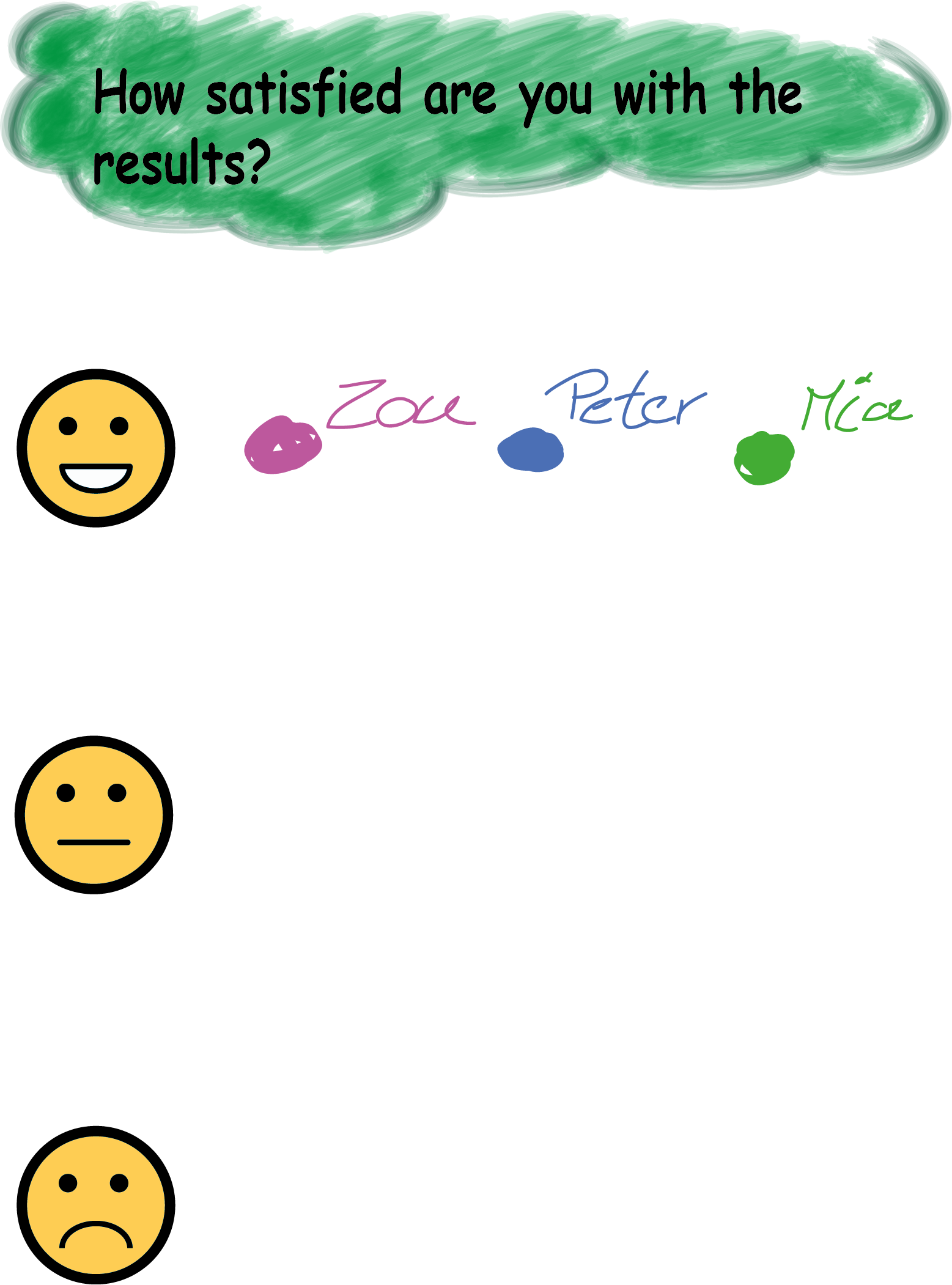 How to Successfully Conclude Your Virtual Workshop
How to Successfully Conclude Your Virtual Workshop
How to Successfully Conclude Your Virtual Workshop
In our previous articles, we discussed how to plan a virtual workshop and effectively use creative methods like brainstorming and event storming. Today, we'll explore why a successful workshop conclusion is essential and how you can achieve it. Expect plenty of practical examples and valuable insights!
Why a Well-Planned Workshop Conclusion Matters
"That's it for today. See you next time!" – Many workshops end with similar phrases. At best, the facilitator loses valuable information; at worst, participants lose motivation for future collaboration. Therefore, you should think in advance about how to conclude your workshop effectively.
Imagine your workshop as the arc of a story: You start with an introduction, leading into the topic. You work intensively on it (the tension rises to a climax and then falls), and you finish with a conclusion. The conclusion provides space for summarizing, looking ahead, and reflecting – both for you and your participants.
Components of a Successful Conclusion
Which elements you include in your workshop conclusion depends on your goals. Do you want participants to continue working on the topic? Then a list of open points might be helpful. Do you want to improve your workshop? Then a feedback session is appropriate. Consider in advance what goals you are pursuing and how the workshop's conclusion supports them.
The Summary
A summary is always beneficial and almost obligatory. It rounds off the workshop and highlights what you've achieved together. Mention the key agenda points, outline the goals of each section, and briefly summarize the results. If you've had time to prepare, present the results visually as you discuss them.
If you're not planning a feedback session, you can also recap what went well and where there's room for improvement. However, avoid singling out individual participants as positive or negative examples. The results of a workshop are always a team effort, and your summary should reflect that.
For introducing the summary, you might say, "I'd like to wrap up our workshop by summarizing the key points." Clearly signal transitions to new topics or the conclusion. You can end the summary with a question like, "I hope I've captured all the important points. Are there any others you'd like to add?" If additional points arise, thank them for the input and conclude the summary.
If you're not creating a detailed report or a list of next steps, the summary serves to establish a shared understanding of the workshop outcomes. Nevertheless, we recommend documenting important results to prevent misunderstandings later on.
A summary is motivating because it makes participants proud of the challenges you've overcome together. It fosters a shared understanding and a sense of unity.
At the end of the summary, thank your participants for their engagement and collaboration. Although the summary is mentioned first here, you should conclude the workshop with it.
List of Open Points and Next Steps
Often, time in a workshop isn't sufficient to cover all aspects thoroughly. It's helpful to maintain a list of important yet unaddressed topics during the workshop. At the end, you can review this list together. Perhaps some points have already been clarified – great! Agree on what should happen with the remaining items. Do you need another workshop, or can individual participants handle them?
If you decide to have participants follow up on points, note who will handle which topic by when. As the facilitator, ensure that those assigned tasks accept them. Only after they confirm should you note them as responsible. It's also important that while teams can work on topics, there should always be one main responsible person. Otherwise, roles may be unclear, and the topic might not be pursued.
If no one takes responsibility, further discussion is needed. If no one wants to take on a task, consider dropping the topic. A subject that everyone deems important but no one wants to address might not be that critical.
From experience, sometimes everyone finds a topic important, but no one feels capable of handling it. In that case, appoint someone to find an expert to ensure the topic is addressed (by someone else).
Gathering Feedback
Feedback is crucial for understanding your participants better and improving in your role as a workshop facilitator. It's beneficial to ask for feedback not just at the end but also throughout the workshop, such as after sections or breaks. While you can overdo it, workshops tend to suffer from too little feedback – so don't hesitate!
There are various ways to gather feedback. With few participants, you can give each person a chance to speak briefly. In virtual meetings, you might need to encourage them a bit. Proceed as follows:
- Express what you'd like, e.g., "I'd like to know how satisfied you are with the results so far."
- Wait briefly to see if someone starts on their own.
- If not, explain why their feedback is important to you.
- If still no one responds, start yourself and mention that you'll go through the participant list one by one.
- Note the feedback, ask clarifying questions if needed, and thank them. Do not judge the feedback – pay attention to your non-verbal communication.
In larger groups, other methods are necessary. Online surveys are a good option. You can find an overview of open-source survey tools here.
The feedback at the end of your workshop can include multiple questions, even about the workshop's structure and format. This helps you learn what worked well and what didn't. With multiple questions, a survey is particularly useful. You can discuss the results in the group; participants might want to comment on their evaluations.
Regardless of the feedback, thank them for it! Don't be discouraged if it's not entirely positive. Every piece of feedback helps improve your workshops or their content.
The Workshop Minutes
Minutes are helpful for documenting results and decisions, forming the basis for future actions. They can also include information about participants and open issues.
You can write the minutes during the workshop (or have someone else do it) or afterward. This doesn't necessarily belong to the workshop's conclusion but can be seen as follow-up. However, experience shows it's beneficial to keep brief notes during the workshop. Similar to the list of open points, you can review and discuss the minutes at the end. If the minutes are created afterward, remember they are only valid once all participants have agreed. Therefore, prepare and distribute them as soon as possible so the workshop information is still fresh. Ask participants for improvements and set a deadline after which the minutes are considered approved.
Post-Workshop Follow-Up
You've made it – your virtual workshop is complete! However, your role as facilitator isn't over yet. The follow-up is an essential part of the workshop. Several tasks are important here:
- Assign and Distribute Results: Assign the workshop results to the objectives, archive them, and distribute them to participants and other stakeholders. Decide who needs which information and whether certain topics are confidential (e.g., feedback) that you won't share further.
- Distribute Minutes and Track Open Points: Share the minutes and the list of open issues with participants and monitor their progress.
- Reflect on the Workshop: Ask yourself questions like: What went well? What were you less satisfied with? Did you achieve all goals, and are the results helpful? These questions help identify areas for improvement in planning or execution. For example, if the wrong participants were selected, it's understandable why some topics couldn't be fully addressed. If there were too many participants, you might have gotten sidetracked and not achieved all goals. Be self-critical and derive concrete changes for your next workshop.
Case Study: Mia's Successful Workshop Conclusion
Mia, Peter, and Zou completed the event storming in their last workshop. With the information gathered, they plan to later derive and plan concrete work packages. But first, Mia wants to conclude the workshop properly.
She has been taking notes for the minutes throughout the workshop. During the last major break, she structured the minutes and incorporated the results. She plans to use the minutes as a summary as well.
Before discussing the minutes together, Mia wants to know how satisfied her friends are with the workshop and its outcomes. Zou begins: She's amazed at how concrete the vision of the video chat is now. She knows exactly what tasks lie ahead, the advantages their video chat will have, and she's excited to start. She liked the structure and format of the workshop; both the brainstorming and the event storming were enjoyable.
Peter particularly appreciated the open discussions. He feels Mia moderated and prepared the workshop well. His goal of having fun during the workshop was definitely achieved.
Mia thanks them for the feedback and the great workshop, which wouldn't have been possible without her friends. Together, you achieve more!
Mia's Minutes Template
Mia had already prepared a template for the minutes:

She briefly reviews the agenda and then goes through the brainstorming and event storming points. She explains the goals she had set and describes her approach. Then she summarizes the key results and compares them to the objectives. Some topics remained open; she points these out and notes them.
They jointly remove some open topics from the lists. Mia transfers the important points to the summary of open issues. They also agree that each person will derive concrete work packages from the event storming for their area of responsibility. For other topics, they assign a responsible person and a target date.
For the conclusion, Mia has planned something special. She created a graphic, which she shares via her whiteboard. At the end of the workshop and after reflecting on the results, she asks everyone to provide feedback by choosing a color and placing a dot on the graphic, optionally with their name.

Mia is pleased with the result, thanks her friends for the successful workshop, and explains that she will organize, archive, and send all documents to everyone.
In the next article, Mia, Peter, and Zou will move on to detailed planning. You'll learn how they proceed and which tools they use.
Note: This article is part of our series on virtual workshops and effective project planning. Discover more posts on project management, agile working, and self-organization on our blog.
Share your experiences or ask us your questions about concluding a virtual workshop! Leave a comment or discuss with us on X or LinkedIn.